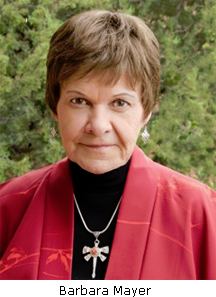“Words Mean What I Want Them To Mean”
By Barbara Mayer
Image may be NSFW.
Clik here to view. As a writer who has made a career of dancing with words, the line “Words mean what I want them to mean” carries one of the most telling realities we face today. That is the personal interpretation of any word which often leads to great errors of judgment, bias, and exclusion. Take, for example, the words “elderly” and “elder”.
As a writer who has made a career of dancing with words, the line “Words mean what I want them to mean” carries one of the most telling realities we face today. That is the personal interpretation of any word which often leads to great errors of judgment, bias, and exclusion. Take, for example, the words “elderly” and “elder”.
To call someone an elder, in many traditions, is to acknowledge one’s wisdom and great advancement in the Art of Being Human. It is a term of honor. To use the word “elderly” in today’s society, however, can mark someone of at least physical, if not mental, diminished capacity. Both terms have their merits as well as their deficiencies, and as one who has been given the gift of years, I too face the challenges of continuing to grow into “wisdom, age and grace.”
With so many senior citizens in Sedona and the Verde Valley, it may be wise to consider what changes are due to age and which ones suggest possible mental illness. Those who are in their senior years, as well as those who know them, need to be aware of warning signs in the elders among us. Sadness or depression lasting longer than two weeks, as well as withdrawal from social activities or usually pleasant events may be signs someone needs help.
Problems with concentration or decision making, as well as feelings of worthlessness, guilt or helplessness, should be noted, as well as short term memory loss or trouble handling finances. Changes in appearance of dress, isolation, or difficulty in maintaining one’s home or property should also be noted, but signs of dementia are the most important to detect. Depression and mood changes often go undiagnosed and untreated, as well as anxiety, which encompasses other issues such as hoarding, phobias and post-traumatic stress disorder.
Seniors may be noting some of these behaviors in themselves, yet often fail to seek help because of feeling ashamed, fear of losing their independence, or because they just consider these signs as part of the often debilitating aging process.
Is there help? Yes. There are professionals in our midst who are trained and dedicated to providing care for seniors in trouble. Greater awareness within our communities will also provide more support for seniors who need assistance. Age is a gift of continuing life, and when one needs some help from diminishing mental health, there are qualified sources in our area to provide assistance. For starters, visit www.nami-sedona.org. In addition, as all of us deal with the gift of our own aging process, we can also be people of support for those who need our help.
The words which can mean what we beautifully intend them to mean are compassion, caring, awareness and action, so that, eventually, the words ‘elder’ and ‘elderly’ will become synonymous in people’s minds as equal terms of honor and respect.
Barbara Mayer is a poet, author and interfaith/interspiritual minister who lives, writes and shares the Spirit in Sedona, Arizona.
